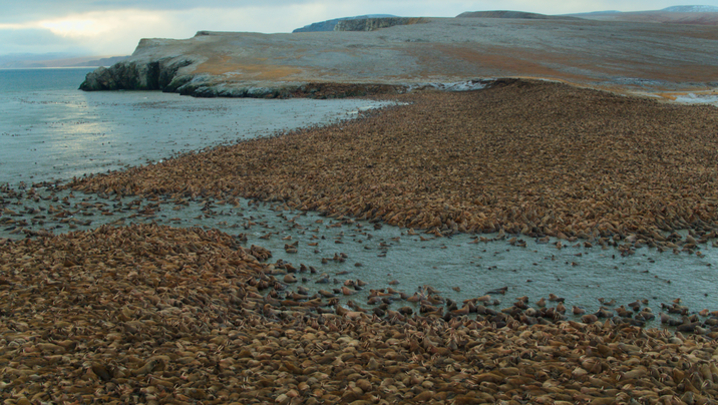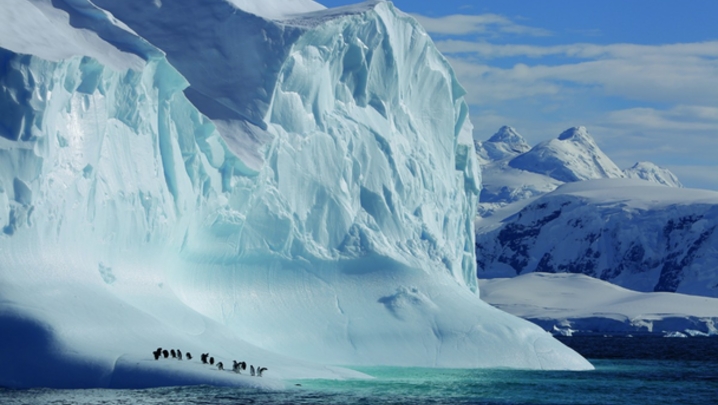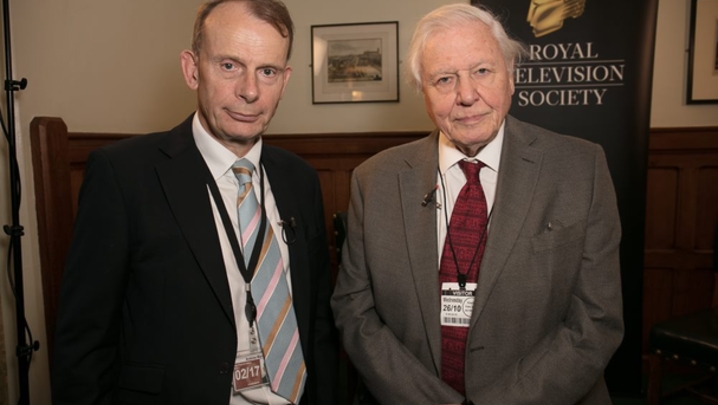Alastair Fothergill tells Pippa Shawley why his latest project, Netflix’s Our Planet, is his most ambitious documentary
Like an entire generation of wildlife film-makers, Alastair Fothergill was drawn to television by David Attenborough. His 1979 series, Life on Earth, showed the young Fothergill that natural history programming was “a good way to be paid to be near animals”.
Fothergill, who was recently made a Fellow of the RTS, spent almost three decades at the BBC Natural History Unit (NHU). This included a five-year stint as head of department, when he landed several global hits, including The Blue Planet, Planet Earth and Frozen Planet.
He went on to found his own production company, Silverback Films, with his former NHU colleague Keith Scholey. His team is now working on Netflix’s first natural history series, Our Planet. “It’s by far the biggest thing I’ve ever done,” says Fothergill. “And the TV series, literally, is the tip of a massive iceberg.”
In addition to the eight-part series for the streaming service, Netflix and Silverback have partnered with the World Wildlife Fund (WWF) to create a “halo” of extra digital content, expanding on the environmental concerns raised in the TV series.
This extra dimension is appealing to Fothergill: “A lot of people talk about web activity and not a lot of people put any real money into it,” he says. “What’s exciting about this is that we have really significant investment in it.”
Originally, Fothergill hoped that the BBC would be interested in the series, which he sees as a continuation of the topics covered in Planet Earth. The BBC, however, was worried that the WWF’s involvement might breach its editorial policy guidelines.
He adds: “We’ve got Google and Facebook very excited about this. That would’ve been hard to manage with the BBC. There’s no doubt that this was one of the advantages of working with Netflix.” Netflix, he suggests, is the perfect fit for the kind of high-budget, natural history series Silverback was set up to make.

(Credit: Paul Hampartsoumian)
Our Planet will explore the habitats of the earth, highlighting the value of those places to the world’s ecology. At the same time, the producers recognise that viewers don’t want to sit through an hour-long lecture on climate change.
“There’s an amazing conservation story out there about the value of habitats and why they’re important,” argues Fothergill. He says that the digital content around the series will go into more detail about the challenges in conserving these places.
While Fothergill won’t be drawn on how much the streaming service has put behind the series, he says that the budget compares “very well” with what the BBC would offer. Our Planet is Netflix’s second major British order, after Left Bank’s The Crown.
Fothergill has just returned from a month-long trip to Antarctica, where his team was filming Adélie penguins for a Disney theatrical release, the latest in a flow of projects for its wildlife strand, Disneynature.
Silverback currently has three films in production for Disney, as well as landmark series for both Netflix and the BBC, so it’s a busy time for the 50-strong team.
The disquiet surrounding Brexit and the election of Trump is partly responsible for the popularity of BBC One’s recent Planet Earth II, he believes.
It would not be the first time the genre has provided a welcome refuge from the news. On 11 September 2001, Fothergill was live on The Gloria Hunniford Show, promoting Blue Planet, when the second plane flew into the World Trade Center in New York. The series was due to air the following day. He recalls: “I was almost embarrassed to think it, but I did think, ‘Oh, bloody hell, we’ve worked for five years and it’s all gone up – literally – in smoke.’”
The BBC aired nothing but news coverage until 8:00pm the following evening, when 12 million people tuned in to hear the soothing tones of David Attenborough. “The very fact that there were no people there, not even David Attenborough, was actually quite a good tonic,” says Fothergill. “It was a way to escape.”
Attenborough has been synonymous with British natural history programming for many decades, having presented wildlife programmes since the 1950s. Now aged 90, the veteran broadcaster is still in high demand. The issue of what will happen to natural history programming after he dies is one that has been discussed for many years.
“He is going to leave a massive, massive hole,” says Fothergill, who has been fortunate enough to work with him on many occasions. But one of the benefits of owning a production company, he says, is being able to back new talent.
“Keith [Scholey] and I wanted to employ very good people, but also just pleasant people. Life’s too short. You get to a stage in your life when you’re just bored of dealing with idiots. You can manage that better when you’ve got your own company,” he laughs.
Since joining the BBC 30 years ago, Fothergill has seen the gender balance within his genre change completely. Women now hold jobs that were traditionally dominated by men. There is still some way to go, however. Men still significantly outnumber camerawomen. Fothergill is quick to champion the work of Sophie Darlington. She was a key part of the team on BBC One’s The Hunt, recently nominated for an RTS Programme Award, and is now working on Our Planet.
Then, there is the fact that natural history is still dominated by the white middle class. Fothergill’s plummy tones are indicative of his own background – he was educated at Harrow before going on to study at the universities of Durham and St Andrew’s.
“There’s no doubt that one of the things we need from people is what we call ‘muddy-boots experience’,” he says. “You can have a first in zoology, but you’ve got to know how to behave around an elephant.”
Natural history film-makers have often been criticised for presenting the world through rose-tinted spectacles, but Fothergill emphasises the importance of showing audiences what goes on outside their living rooms.
“How can you possibly care about the natural world if you’ve never seen it?” he asks.
While stunning photography is crucial to a hit series, it is important that a programme has more than beautiful shots of wildlife. Fothergill pushed for episodes about global warming and conservation in Frozen Planet and The Hunt, respectively.
“In the end, I’m not a journalist,” he says. “My skill, if I have any skill, is delivering top, blue-chip, landmark natural history.”
He believes that there are some essential elements to a good series: “In the UK, I think you have to recognise that the audience is very sophisticated. They’ve seen a lot of natural history.” Each new programme, therefore, has to be bold, comprehensive and risk-taking.
And the show’s premise needs to be simple: “If you can’t explain the series in one line, you’re dead in the water.”
There is clearly still an appetite for Fothergill’s brand of high-budget documentary. In his view, “What could be nicer after Strictly on a Sunday evening than to go into the beauties of the natural world, before a nice bloke takes his shirt off in Poldark? I mean, it’s the dream evening, isn’t it?”






